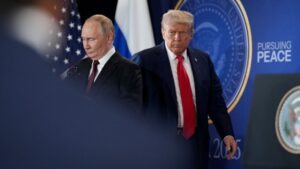The United States has intensified its pressure on Russia amid the ongoing conflict in Ukraine by imposing sweeping new sanctions targeting the country’s two largest oil companies. This move marks a significant escalation in Washington’s strategy to weaken Russia’s economic capabilities and disrupt its energy sector, which is central to its revenue and geopolitical influence.
In a decisive step, the U.S. Treasury Department announced comprehensive sanctions against Rosneft and Lukoil, Russia’s two oil giants, which collectively account for a substantial share of the country’s oil production and exports. These sanctions restrict the companies’ access to U.S. financial markets, prohibit American companies and individuals from engaging in business with them, and target key executives within their leadership. The crackdown aims to curtail Russia’s capacity to finance its military operations and undermine the Kremlin’s aggressive posture in Ukraine.
This tough stance by the United States comes against the backdrop of prolonged and stalled peace negotiations between Russia and Ukraine. Earlier, President Trump had planned a high-profile summit with Russian President Vladimir Putin, envisioned as a potential catalyst for renewed diplomatic engagement. However, the U.S. President abruptly canceled the summit, citing a persistent lack of meaningful progress in the peace talks. This cancellation underscored Washington’s frustration with Moscow’s unwillingness to make concessions or halt its military advances in eastern Ukraine.
The sanctions on Rosneft and Lukoil are multifaceted. By targeting these energy behemoths, the U.S. government intends not only to deprive Russia of crucial financial inflows but also to send a signal to international investors and companies about the risks of continuing business ties with sanctioned entities. Rosneft, partly state-owned, is a key player in Russia’s oil export strategy, often collaborating with European and Asian markets. Lukoil, largely privately owned but influential, also has significant operations abroad. Disrupting their access to international finance and technology will likely strain their ability to sustain and grow oil production amid challenging global market conditions.
The timing of these sanctions is particularly notable. The U.S. decision follows extensive consultations with European allies, who have been increasingly aligned with Washington in condemning Russia’s actions and seeking to impose coordinated and effective punitive measures. Analysts suggest the enhanced sanctions send a clear message that President Trump’s administration is shifting from diplomatic engagement attempts to more assertive economic pressure, reflecting a hardening stance in response to Moscow’s ongoing aggression.
The consequences of these sanctions extend beyond the immediate energy sector. Russia’s economy is heavily dependent on hydrocarbon exports, which fund both domestic priorities and military expenditures. Restricting its oil companies’ capabilities could lead to decreased production, reduced government revenue, and increased internal economic challenges. This could, in turn, influence Russia’s calculus regarding the Ukraine conflict, potentially pressuring Russian leadership toward reconsidering its military strategy.

However, some experts caution that the sanctions alone may not compel Russia to change course quickly. The Kremlin has previously demonstrated resilience to Western economic penalties by pivoting to alternative markets, developing domestic substitutes for banned technologies, and leveraging geopolitical partnerships including with China and other non-Western countries. Moscow’s response will likely aim to mitigate the impact of sanctions and avoid direct escalation, though the risk of retaliatory actions remains.
In addition to economic measures, the cancellation of the Trump-Putin summit signals a diplomatic impasse. The U.S. administration made clear that negotiations require demonstrable progress toward peace and respect for Ukraine’s sovereignty. The failure to advance meaningful dialogue and the concurrent imposition of sanctions reflect mounting frustration and a recalibration of U.S. policy toward a more confrontational approach.
The growing international divide encapsulated by these developments highlights the complex and high-stakes nature of the Ukraine conflict. The U.S. sanctions on Russia’s oil giants are designed to tighten the economic noose around Moscow while reinforcing the broader coalition of countries seeking to support Ukraine and restore stability in the region.
As this geopolitical contest unfolds, the world watches closely how Russia will navigate these constraints and what impact the combined economic and diplomatic pressures will have on the future of the Ukraine conflict. The United States’ move to impose robust sanctions and cancel the summit underlines its determination to leverage all available tools to influence Russia’s actions and reaffirm support for Ukraine’s sovereignty and territorial integrity.

